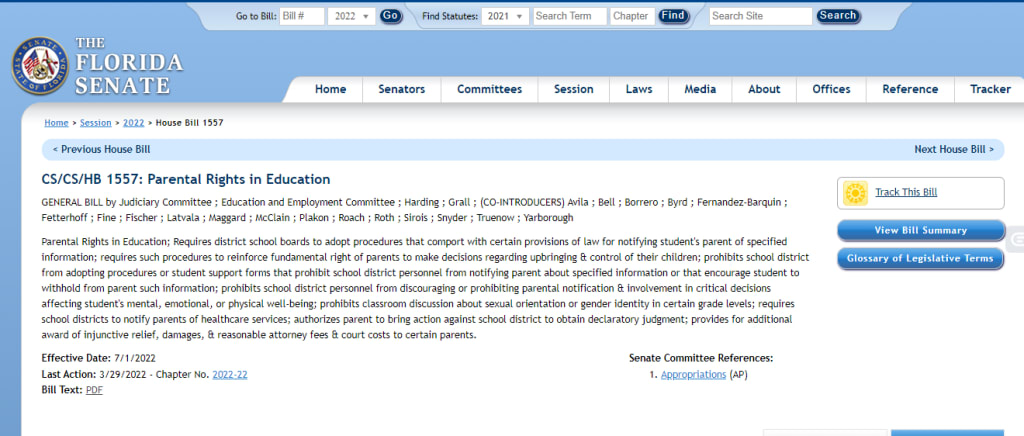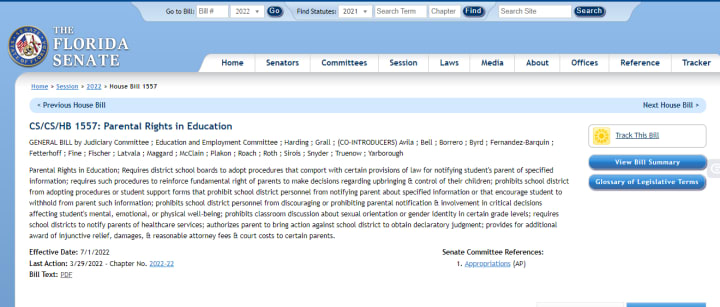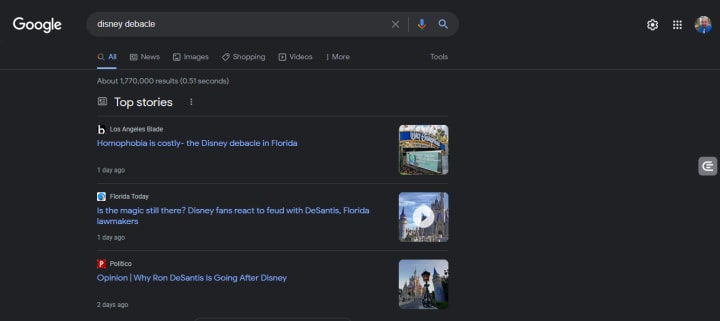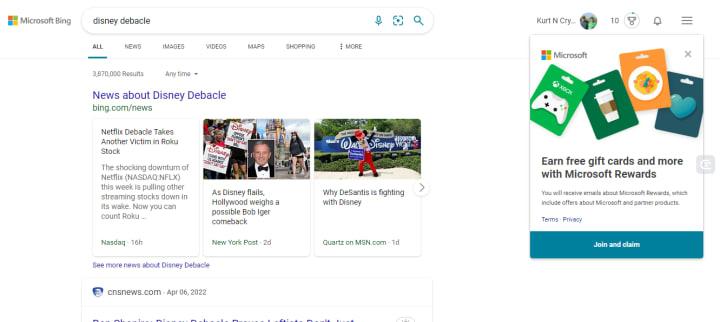Read The Bill-It’s Here — Know the Facts of The Disney Debacle
A critique of the media coverage, the facts behind both sides' arguments, and a very valuable lesson on the slant of media pieces

To start, back in January 2022, a Judiciary committee for the State of Florida introduced House Bill 1557. The bill was also introduced as the “Parental Rights in Education” bill, and was recently sarcastically, (and incorrectly I might add) dubbed the “Don’t Say Gay” bill by Disney CEO Chapek.
The following is a screenshot of the cover page for the introduction of that legislation as well as the synopsis of the bill.

If the print is too small for you to read, I quote it verbatim next. What’s more, later, I will be providing a link to this page and the bill itself, as it is live on the website of the Florida State Senate. That way you can peruse the actual documents themselves.
I know there are always people who refuse to believe the truth and want to insist that people alter these kinds of things in some way to deceive the public. Because of that, transparency and integrity are of paramount importance in my work as a journalist; where my reputation is everything, and rides shotgun, while rhetoric, hyperbole, and sensationalism take the back seat — always.
The cover synopsis of HB 1557 in its entirety says:
GENERAL BILL by Judiciary Committee; Education and Employment Committee; Harding; Grall ; (CO-INTRODUCERS) Avila; Bell; Borrero; Byrd; Fernandez-Barquin; Fetterhoff; Fine; Fischer; Latvala; Maggard; McClain; Plakon; Roach; Roth; Sirois; Snyder; Truenow; Yarborough
Parental Rights in Education; Requires district school boards to adopt procedures that comport with certain provisions of law for notifying student’s parent of specified information; requires such procedures to reinforce fundamental right of parents to make decisions regarding upbringing & control of their children; prohibits school district from adopting procedures or student support forms that prohibit school district personnel from notifying parent about specified information or that encourage student to withhold from parent such information; prohibits school district personnel from discouraging or prohibiting parental notification & involvement in critical decisions affecting student’s mental, emotional, or physical well-being; prohibits classroom discussion about sexual orientation or gender identity in certain grade levels; requires school districts to notify parents of healthcare services; authorizes parent to bring action against school district to obtain declaratory judgment; provides for additional award of injunctive relief, damages, & reasonable attorney fees & court costs to certain parents.
The bill itself is uncharacteristically short. At just seven pages in length, it never ceases to amaze me how people could do their best to manipulate the intent and the content of such a tiny piece of legislation.
In all my years as a student of political science, it is a common occurrence for “the truth” (the often ambiguously hidden true intent of a bill, by design clandestinely hidden amongst countless pages of rhetorical fluff) to get mired in the banal pages of these kinds of bills.
This is honestly the first time I’ve ever seen a group of people try to misrepresent the intentions of a seven-page bill, but I guess that’s about where we are as a society these days.
Of course, the direct link is provided below. But first, there have been so many misconceptions about the bill, what it stands for, and what it does, that I want to highlight these before you read the bill so you can see exactly what I’m saying when you do.
Pages 1 to 4
As you read pages 1–4 of this bill, you’ll plainly see that the primary function of the legislation is to make sure parents retain the right to govern and control the content of their children's education in Florida’s public schools. What’s more, this particular piece of legislation is specifically geared to children in grades K-3 only — a critical element of this bill that every single one of its detractors conveniently leaves out of their tirades.
Section 1 of the bill (Pages 1–4)
This section basically states that schools must develop a system of notifying parents if it looks to school officials like the child is having a hard time academically, psychologically, physically, or emotionally; or, if the school feels its ability to provide a wholesome and nurturing environment for the student is in any way compromised.
Straightforward enough I think.
Section 2 of the bill (Page 4)
This brief section explains that no school or school administrator shall develop any kind of written waiver that will exempt any child or the rights of any parent, from the protections set forth in this bill.
Put simply, these protections are non-revokable, even if the parents were to sign some form of consent or waiver. This section makes even the existence of such a waiver or consent form, illegal.
Section 3 of the bill (Page 4)
This is really the meat and potatoes of the fight, even though it's only one sentence. That’s right, it's just a single sentence at eh end of page 4 and a few words onto page 5.
Since it is so short, I will quote it directly:
3. Classroom instruction by school personnel or third parties on sexual orientation or gender identity may not occur in kindergarten through grade 3 or in a manner that is not age appropriate or developmentally appropriate for students in accordance with state standards.
Please take note here, that there is NOTHING in this text that says a word about gay rights, LGBTQ+, or any other demographic of people.
This sentence simply says that it is inappropriate to discuss or teach any material pertaining to sex, sexual orientation, or gender identity with children in grades K-3 (5–9 years old respectively). It also clarifies that not only can’t school employees teach it, they also can’t bring in any kind of ‘specialists’ to teach it.
This is what fires me up about this debate.
The entire stink was made over the “Don’t Say Gay” bill as Disney’s CEO called it, meanwhile, the bill has nothing at all to do with the gay community. In fact, it should have been dubbed the “Don’t Say Sex” bill because that’s essentially what it is.
Further, I can’t fathom any parent that would want their 5–9-year-old child learning about any kind of sexual topic before they learn their multiplication tables.
The rest of the bill
The remainder of the bill stipulates that all parents have a right to know exactly what type of health, physical fitness, and biological content the school is planning to deliver. Also, the school is responsible to instruct the students that if they feel uncomfortable about any topic addressed, the student should promptly discuss the issue with their parent(s).
The bill closes by stipulating the possible legal recourses parents have against the schools and the school boards should they disregard any of these laws, and, after being warned to cease and desist, continue the improper conduct.
And that, my friends, is the entirety of Florida’s HB 1557. The cover page, which includes the summary I quoted, can be found here: The Florida Senate — Parental Rights in Education.
As a journalist, it disturbs my soul that today’s media and many of the world’s tyrannical elite (like Chapek, Gates, Turner, and Soros, to name a few) spare no expense and carry no shame for trying to distort facts, sway opinions, cause division, and manipulate minds.
In this case, minds that are even as young as five years old.
As a lesson in the persuasiveness of journalistic slant, I would very much like for you, avid reader, to participate in a little experiment with me. I believe it’s a fantastic lesson in how manipulative media can be, particularly when they are given an incentive to be manipulative, as many in today’s media are.
This experiment should be carried out in two parts. First, using the Google search engine, simply search the keywords ‘Disney debacle’. Then do the same thing using Microsoft’s Bing search engine. And lastly, do it using Yahoo search.
Now, for some reason, my screenshot app will not allow me to take a shot of the Yahoo results page, but here are the screenshots I go from Google and Bing.


Search engine algorithms change all the time, so I’d be interested to hear what your results are in the comments. But what struck me as most funny, is that Yahoo and Bing brought up virtually identical results pages. Even more telling, is that each of their stories on their entire first pages respectively talk about the disgrace of Disney and how their CEO can’t make any more mistakes.
Moving over to the Google results page for the exact same keyword terms, the first thing we get is an article on — wait for it — homophobia. I write fiction as a big part of my annual income and I tell you, I just can’t make up stuff this good.

This is what I mean by the slant or bias of a piece or a search
If you click on any number of these articles or tune your TV to any news channel, the slant of that particular platform’s management and ownership is going to directly influence the slant of the content you receive from them.
One will tell you that Disney and its CEO are a disgrace, others will tell you DeSantis is a lunatic. Very few will actually read you the seven-page bill as it is and let you decide. That’s what journalists are supposed to do. We are supposed to relay the facts, as many as we can from both sides, and then let you decide how you want to interpret those facts.
I challenge you as writers to be different. Go the extra mile. Make the extra effort. Hide your personal biases and present the facts — if they really are the facts, they will usually stand on their own merits.
That doesn’t mean that you can’t have personal feelings about the topics you write about. But this is one of the most gaping differences between being a blogger and being a writer. Bloggers write opinions — that's what a blog is.
Writers, in contrast, relay facts unless they are expressly writing fiction. And if they can’t resist the urge to inject their opinions, they write op-ed pieces and clearly present that their opinions are present.
I could have spent most of this article demolishing Joe Biden with words for his comments about Florida… “going after Mickey Mouse.” I don’t see much need. Honestly, anyone who could give serious credence to that kind of cognitively compromised comment is rationally compromised and probably beyond reason anyway.
See? That last paragraph was all opinion
And while it accurately reflects my opinion of the current POTUS, it really has no place in this article. Nevertheless, I just used a tactic that most modern journalists do, and I inserted my opinion as if it were a fact.
Sadly, if I didn’t disclose the opinion disclaimer after it, there are those who would have read it and accepted it as the unimpeachable truth. This is something we need to get much better at policing as a society.
I also have some very strong opinions about how we can start that process, but that is certainly material for a different article.
After reading this piece, and the text of HB 1557 for yourself, I would love to engage in a dialogue regarding the legislation and see what you think about the subject. Unlike many journalists today, who want to believe they are omniscient, I eagerly invite the opinions of others.
Healthy debate is one of the cornerstones that made America into the country that it is after only 240+ years of existence — a feat that's never been done, before or since, in the history of this planet.
So feel free to comment about any part of this that might be weighing on you, no matter what side of the fence you’re on, or if you find yourself precariously straddling it.
As always, thanks for reading!
About the Creator
Kurt Dillon
Kurt Dillon is an Author, Writer, Educator, & Chef with Master's Degrees in English/Journalism and Clinical Psychology from Columbia University. He has worked as a writer and as an Associate Professor of English for almost 30 years.






Comments
There are no comments for this story
Be the first to respond and start the conversation.